OCCUPY CENTRAL - DAY 29: Full coverage of the day’s events
UK delegation probing Hong Kong's political reform may visit next month
PUBLISHED : Sunday, 26 October, 2014, 5:50am
UPDATED : Sunday, 26 October, 2014, 5:50am
British Parliamentary Foreign Affairs Committee chairman Richard Ottaway says the trip was necessary despite Beijing's warnings.
A delegation of British lawmakers accused by Beijing of "meddling'' in Hong Kong affairs could arrive in the city as early as next month for a parliamentary inquiry.
As political tensions persist and the Occupy Central protest enters its second month amid high-level accusations of "foreign interference'', the chairman of the British Parliamentary Foreign Affairs Committee said its requests to meet Hong Kong and central government figures had been rejected.
The delegation plans to take evidence as part of an inquiry into whether the terms of the Sino-British Joint Declaration - which laid the foundations of the city's return to Chinese sovereignty - have been breached.
Committee head Richard Ottaway said the trip was necessary despite Beijing's warnings.
"We never do a report without visiting the country that we are assessing because you can't assess … without actually talking to people in Hong Kong," he said.
Ottaway said both the Hong Kong and central governments had declined invitations to meet but meetings with a number of other key figures in the city "had not been rejected".
He declined to identify those figures or say exactly when the delegation would arrive but it is understood the second half of November has been pencilled in.
Of the rejections, Ottaway said: "It would make it much easier for us to make a judgment if we heard their side of the arguments, though I think they've made their position pretty clear already so I've got some idea where they are coming from."
The committee also expects to take evidence from the last colonial governor, Chris Patten.
The committee launched the inquiry in July to examine the implementation of the Joint Declaration, which states Hong Kong should have a high degree of autonomy and executive power and that personal rights must be enshrined by law.
It soon received a warning from China's ambassador to Britain, Liu Xiaoming, not to visit Hong Kong. It was followed by a strongly worded letter from the National People's Congress Foreign Affairs Committee demanding the visit be scrapped.
In the run-up to the inquiry, the committee took evidence from former chief secretary Anson Fang On-sang and Democratic Party founding chairman Martin Lee Chu-ming, who raised concerns that London did not express a view on Beijing's recent white paper on the city.
Critics say the white paper, which stressed Beijing's "comprehensive jurisdiction" over Hong Kong, runs counter to the promise of a high degree of autonomy in the Joint Declaration.
"This report will be … read not just here but I suspect in a number of capitals around the world," Ottaway said. "It's essential that it has credibility, that this inquiry is conducted properly."
This article appeared in the South China Morning Post print edition as UK probe team may visit next month
Protests stem from Western ideals and mistrust of Beijing, ex-policeman says
PUBLISHED : Sunday, 26 October, 2014, 5:50am
UPDATED : Sunday, 26 October, 2014, 5:50am
William Tang says Hong Kong people got used to the Western style of living and thinking for 150 years, so it's only natural that they see things differently from the mainlanders.
The political strife in Hong Kong stems from Western ideals introduced to the city after the first opium war, coupled with a "deep-rooted mistrust" of Beijing, according to a former high-ranking police official.
The 1989 Tiananmen Square crackdown also loomed large behind the discontent and division gripping the city, said William Tang How-kong, 58, a former assistant commissioner of police.
"This so-called Occupy Central movement can be traced back to the opium war in 1842 ... because as a result of the war, Hong Kong became a British colony," Tang said.
"Hong Kong people got used to this Western style of living and thinking for 150 years, so it's only natural that they see things differently from the mainlanders."
The 34-year force veteran, who was director of management services and also spent a year as head of its public relations arm, said the use of tear gas - which critics have labelled as heavy-handed - was appropriate and pointed out the decision was made by an expatriate officer.
"If there is a small group of people who can remain politically neutral in the whole incident, then it must be the British police officers. They don't have vested interests," he said.
Police use of tear gas also showed that Hong Kong could deal with the situation on its own, Tang said.
"I sympathise with no one because I insist on being politically neutral. Of course, personally I may have a view, but that is insignificant. I have no emotional attachment," he said.
"Actually, I'm a believer in postmodernism and the beauty of postmodernism is they don't believe in one single system, no single answer to these social, political issues."
Tang said knowledge gained on two overseas study tours during his career - at University of California Berkeley's graduate school of public policy and at the Royal College of Defence Studies in London - had allowed him to form a more "sophisticated'' understanding of the complexities of Occupy Central and he felt motivated to share them.
"One way is to interpret that Hong Kong is fighting for democracy; another way is that the rule of law is being eroded," he said.
His words echoed those of former chief executive Tung Chee-hwa, who on Friday said the protests were tearing the city apart.
Since the 1997 handover, Hong Kong has been grappling with its interpretation of the "one country, two systems" model, Tang said, adding that "anyone who believes there is a simple solution to this conflict is naïve and simple-minded".
"In terms of sovereignty, the handover was easy, but in terms of hearts and minds, you see there has been continuous debate," he said.
This article appeared in the South China Morning Post print edition as Strife 'caused by Western ideals, mistrust in Beijing'
Ferocity of abuse from Occupy protesters startling, police veteran says
Policeman David Jordan says protests are unlike anything he has experienced in 22 years in city
PUBLISHED : Sunday, 26 October, 2014, 5:50am
UPDATED : Sunday, 26 October, 2014, 5:50am
David Jordan has served for 22 years. Photo: Jonathan Wong
An expatriate police officer working on the front line of Occupy Central says he has never before encountered such a level of verbal abuse - including racial abuse - in 22 years of policing Hong Kong protests.
While images of police using tear gas and pepper spray have dominated international coverage, Senior Superintendent David Jordan told a different story.
"Both the ferocity and the volume of the abuse has been quite startling, actually," said Jordan, who has served as an operational commander in Admiralty.
His duties have included overseeing areas such as Lung Wo Road, outside the chief executive's office, the site of several clashes.
"I've experienced abuse unlike I've ever had in over 20 years," with insults in both Cantonese and English, Jordan, 47, said in an interview arranged by the police public relations bureau. "When we were clearing the road, the volume of abuse and almost unadulterated hatred was quite surprising when police officers are basically just carrying out their constabulary duties.
"I'm relatively thick-skinned, but what I get as a frontline commander is nothing like what frontline officers get … I just accept it and get on with it. Our endgame is to maintain public order."
Jordan, who served in Britain's Royal Navy, has worked in VIP protection, the police tactical unit, as well as managing major events like the June 4 vigil and the July 1 pro-democracy march.
He said Occupy had put an unprecedented strain on the force, but also sparked resilience.
"The bond between the experienced and the less experienced … has come together to such an extent that we almost immediately identify areas where people are not comfortable and the assistance. … It's a strength I haven't seen before."
The personal attacks are not restricted to the streets.
"I don't do Facebook any more because of the abuse," Jordan said. "Professionally, the politicisation doesn't affect me but personally, for a lot of my local friends, the 'de-friending' and the Facebook abuse is an aspect that this operational deployment brought to the fore."
The married father-of-three said one lesson from the past month had been how a single image could define for the public an operation that lasted hours.
"All it takes is one image of a baton, maybe used to take down an umbrella that has been poked at an officer's face. How that is spun will dictate whether it's seen as heavy-handedness or an appropriate level of force," he said.
"Having been there, I would say it's nearly all been an appropriate level of force."
Police have been widely criticised for their handling of a protest largely portrayed as peaceful. There have been frequent accusations of heavy-handedness.
But Jordan says: "We've used force but it has always been a reactive, defensive mechanism to enable us to resume some form of order and stability."
And he said the actions of some protesters had created an antagonistic atmosphere: "Protesters overtly arriving in huge face masks, hard hats and goggles. That's intrinsically not peaceful."
This article appeared in the South China Morning Post print edition as 'The ferocity of the abuse has been startling'
Diplomats walk a fine line as Hong Kong protests grip world's attention
PUBLISHED : Sunday, 26 October, 2014, 5:50am
UPDATED : Sunday, 26 October, 2014, 9:28am
Hundreds of people hold up their smartphones during a "candlelit vigil" in Tsim Sha Tsui last night, demanding an end to the Occupy protests. The vigil, attended by members of the Alliance in Support of Our Police Force, Justice Alliance and "blue ribbon" activists in support of the police, condemned the Occupy movement for damaging social order. Photo: AFP
To a diplomat, taking care with words should be second nature. But as Hong Kong's unprecedented civil disobedience movement enters its fifth week, the city's diplomats find themselves in a unique, yet tricky, position.
The Occupy Central movement that has gripped the world has given the 61 consulates in one of the busiest diplomatic hubs an even higher profile. But diplomats must tread a fine line as local and central authorities speak darkly of unspecified "foreign interference".
"The consulates need to be here even more in order to report back," University of Science and Technology political science professor David Zweig said.
But the situation was complicated by Chief Executive Leung Chun-ying's vow last week to unmask "foreign forces" behind the protests, amid allegations Occupy organisers had been funded by overseas organisations.
The Sunday Morning Post approached scores of diplomats for their views, though most refused to comment on such a sensitive topic. Those who did spoke only on condition of anonymity.
One diplomat was highly critical of Leung's failure to back up his comments with evidence. "You have to immediately show proof otherwise you lose credibility," the diplomat said.
Zweig said diplomats had to be careful to avoid being accused of meddling in what Beijing calls China's "internal affairs".
Consular sources said a number of senior diplomats recently met the top representative of Beijing's Foreign Ministry in the city, Song Zhe, to discuss Occupy. The ministry could not be contacted to confirm the meeting.
"They wanted to know our opinion," one consular official said. "It's very wise because at the same time, they had the opportunity to tell us what they think."
A spokesman for the Hong Kong government's protocol division said it had received concerns from consulates based in Admiralty about access.
Professor Jean-Pierre Cabestan, head of government and international studies at Baptist University, said the protests had put diplomats at the centre of a historic period for the city.
"It has made their job more colourful … since it is a great time for them … to assess the changing limits and contours of the famous 'one country, two systems' formula," he said.
"A Hong Kong that is more antagonistic to China makes the place more of a diplomatic hub and gateway to China, a city where it is important to be, to exchange ideas, observe debates and assess the implications for the future of China."
In the first few days of Occupy, the Foreign Ministry sent a directive to all consulates advising their staff to stay away from protest sites. A number of diplomats who spoke to the Post said the move was unusual.
"It's certainly not up to the consulate to tell staff to participate or not," one senior diplomat said, adding that they had "never before" received such a letter, and the sentiment was shared across the city's consular corps.
Another consular official said: "The short-term issue is universal suffrage, but underneath that is a much more important problem: disaffection. I totally sympathise with the students. Civil disobedience is a right, even though it might not be legal."
One envoy said it was hard to predict how the protests might affect the city's role as a diplomatic hub: "But it does show that people want to do something with their lives, and not just stay at home and play video games."
Another said the protests would have a positive impact on how the city was viewed. "Demonstrations like this, we can only dream of in our countries," the diplomat said of the peaceful campaign.
One consular official said they sympathised with the protesters: "I understand Beijing cannot change their decision but I hope Beijing will listen carefully."
Another envoy said: "We, as diplomats, are never going to interfere. But we … live here, we are part of Hong Kong and … we express our sympathy with the people without constraint."
Still, most consulates preferred to keep silent.
"There is a concern that any comments will be interpreted in the wrong way," one senior diplomat said. "We are observers; not newspaper columnists".
This article appeared in the South China Morning Post print edition as 'City where it's important to be'
A city divided: Occupy protest and rally by opponents mark a society split by politics
PUBLISHED : Sunday, 26 October, 2014, 5:50am
UPDATED : Sunday, 26 October, 2014, 3:08pm
TVB and RTHK journalists were attacked. Photo: SCMP
Rancour and division after a month of political turmoil crystallised last night as thousands of pro- and anti-Occupy Central protesters gathered on opposite sides of Victoria Harbour to vent their frustrations.
The gatherings - one at the newly dubbed "Umbrella Square'' and the other at the Tsim Sha Tsui Clock Tower - came as Occupy leaders geared up to poll supporters on the way forward while anti-Occupy activists began a signature campaign to end the protests and back the police.
The Alliance for Peace and Democracy said it had collected 321,827 signatures. Food and Health Secretary Dr Ko Wing-man and other senior officials said they would also sign it.
READ: Occupy Central scraps poll on way to move protests forward
Spokesman Robert Chow Yung urged protesters to retreat: "They are ignoring the rule of law and disrupting public order. ... Is that democracy?"
Last night's anti-Occupy gathering in Tsim Sha Tsui - which included "blue ribbon" activists - was marred by attacks on reporters and cameramen.
A woman RTHK reporter was dragged to the ground while a male TVB reporter had his glasses knocked off and tie pulled at.
"They punched and kicked my back and grabbed my tie," the TVB reporter, John Sin, said.
As a crowd surrounded them calling them "traitors", one cameraman was grabbed by the neck and another was pushed to the ground. All were scratched around their torsos and faces.
The stations condemned the violence and RTHK said it would boycott "blue ribbon" events to safeguard staff safety.
Leticia Lee See-yin, of the Justice Alliance that helped organise the Tsim Sha Tsui event, condemned the attackers but said they were individual events.
Yesterday also saw Chief Executive Leung Chun-ying in damage control as he sought to explain his controversial comments last week on the electoral rights of the poor.
In comments to international media, Leung had said a nominating committee was necessary to prevent a "numbers game"' in which chief executive hopefuls would be talking to "half of the people in Hong Kong who earn less than US$1,800 a month".
Yesterday, Leung said: "The Basic Law has clearly stipulated an electoral system that embraces balanced participation. I have repeatedly told the media that 'balanced participation' did not mean slanting towards any sector or class."
He said the establishment of an official poverty line was proof his administration cared about the poor. But his efforts to cool the controversy were in vain.
In an interview with the Chinese-language daily Ming Pao, former chief secretary David Akers-Jones - a heavyweight Leung supporter in the 2012 election - said Leung's remarks were "hasty and rash" and could amplify existing societal conflicts.
Nobel economics prize laureate Paul Krugman weighed in earlier, describing Leung's stance as a strategy "for protecting plutocrats from the mob" in hisNew York Times column.
The Alliance for Defending the Grassroots Housing Rights is launching a non-cooperation campaign calling on public housing tenants to delay payment of their rents to express their discontent over reform.
Meanwhile, Occupy organisers and the Federation of Students yesterday appealed for protesters to join electronic ballots today and tomorrow.
Two motions will be put forward. The first asks whether the National People's Congress Standing Committee should withdraw its earlier decision to limit candidates for the 2017 chief executive election.
The second asks if the multiparty platform for constitutional reform that the local government has suggested should affirm the abolition of functional constituencies in the legislature in 2016 and public nomination for the chief executive the year after.
Some protesters said they would not vote. " "The items of the referendum are the reasons why we are here. I think the vote is meaningless," said Leonard Yuen, 19, who has been at the Admiralty sit-in since it began on September 28. But Occupy Central organiser Benny Tai Yiu-ting said protesters could still make good use of the ballots.
Basic Law Committee member and legal scholar Albert Chen Hung-yee warned that the vote could end badly despite the organisers' good intentions.
It was legally possible yet politically impossible for the NPC to amend its decision, he said.
The Federation of Students yesterday also put forward a way to trigger a referendum on political reform - by having pan-democrat lawmakers resign so as to prompt by-elections, as the Civic Party and the League of Social Democrats did in 2010.
This article appeared in the South China Morning Post print edition as Separate protests mark a split society
http://www.scmp.com/topics/occupy-central?page=1
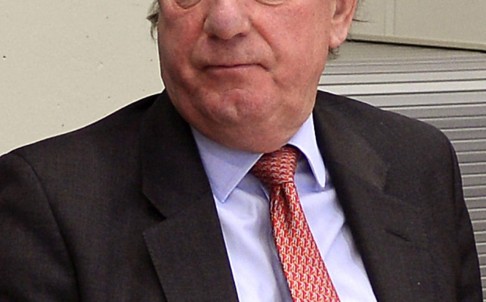
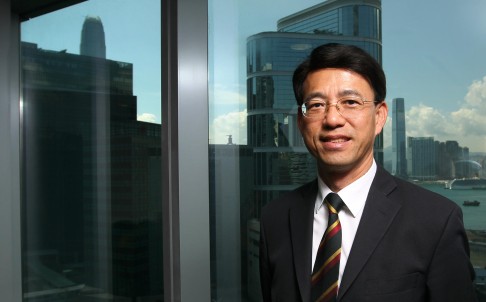
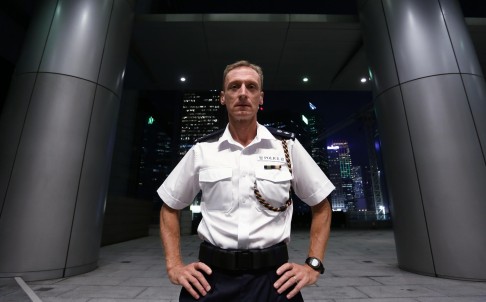
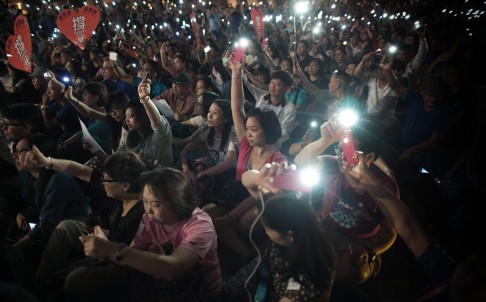
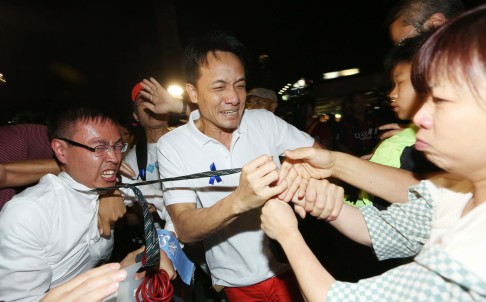

沒有留言:
張貼留言